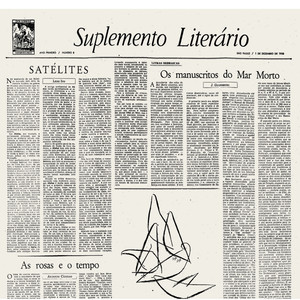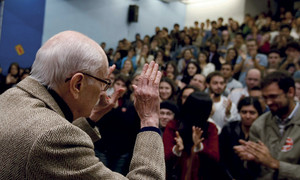
MADALENA SCHWARTZ / MOREIRA SALLES INSTITUTE COLLECTION
For the critic and professor (in a 1982 photo), reading is essential for thinking about the literary work itselfMADALENA SCHWARTZ / MOREIRA SALLES INSTITUTE COLLECTIONOn December 7, 2015, the working group drafting the text for the Municipal Plan of the Book, Reading, Literature and Library of the city of São Paulo sent a letter to then-Mayor Fernando Haddad, suggesting that, upon ratification of the law to institute the plan, already unanimously approved in the House, a tribute be paid to Antonio Candido (1918-2017). The group’s justification was that “among all the great intellectual and civic attributes Professor Candido represents, his was one of the fundamental writings advocating literature as an inalienable right.”
Although the tribute ended up not taking place, the group’s letter reveals the social impact of the work of Candido–who died in May 2017–beyond the university. Continual reference was made to the 1988 document entitled “The right to literature” during the plenary sessions for drafting the plan, and called to mind several times by poet Ruivo Lopes, group representative for the work of the soirées, literary collectives that are largely one of the more salient recent developments of hip hop culture. For the poets and writers from the city’s periphery, the document in which Candido argues that “a just society presumes respect for human rights and the implementation of art and literature in all its forms at all levels, as an inalienable right,” was and continues to be key to the building of the social movement around reading.
The importance surrounding the idea of reading as something essential for thinking about the literary work itself is deeply rooted in the thoughts of Candido, a sociologist, literary critic and emeritus professor of the University of São Paulo (USP). Marisa Lajolo, a faculty member at Mackenzie Presbyterian University, collaborative professor at the University of Campinas (Unicamp) and former orientee of Candido, believes that reading is “implicit” in the author’s most famous work. Formação da literatura brasileira [The development of Brazilian literature], originally published in 1959, “conceives of literature as the inclusion of authors, works and the public in an interconnected system and not as a random plurality–although chronologically close–of authors and works conceived independently of visual articulation in a system,” Lajolo wrote in her piece “A leitura na Formação da literatura brasileira de Antonio Candido,” [Reading in Antonio Candido’s development of Brazilian literature], published in Antonio Candido (2003), edited by the last student the critic advised: Jorge Ruedas de la Serna.

EDUARDO CESAR
The critic began writing for the press in magazines such as Clima…EDUARDO CESARCandido believed that the notion of a literature that can be called Brazilian necessarily requires establishment of a particular “literary system,” a key concept of his analysis. It is that system that allows a series of writings to be understood as literature and, by extension, a national literature. The writings that we consider “literary,” to him do not start out as literature: it is the readers who give legitimacy to the works. In his essay “The seven breaths of a book” (in the 1999 work entitled Sequências brasileiras), Roberto Schwarz points to the uniqueness of Candido’s work: “His sure-footed erudition, the latest of theories, voluminous research, balanced and elegant exposition and well-argued opinion, were all on a scale that was completely new to us.”
One of the issues highlighted in Formação is how to treat literature that was produced in Brazil before this system was established. To Candido, the word “formação” (development) was central to his proposed interpretation. It was not a history of the literature (the initial motivation for the project), but rather, an analysis of “decisive moments” during the establishment of that literary system, in other words, Arcadianism and Romanticism. Candido uses the term “literary manifestations” to refer to works produced before Arcadianism. His argument was that prior production lacked continuity between the generations of writers. In defining his work, he explained that he sought in the book to “determine when and how uninterrupted continuity between works and authors began to be defined, almost always aware that they were part of a process of literary formation.” He concluded by stating: “For lack of any better understanding, always likely in such cases, this occurs beginning in the mid-18th century and becomes fully clear in the first half of the 19th century (…); it is through the Minas Gerais Arcadians, the last academicians, and certain famous intellectuals that we see the emergence of men of letters, forming a critical mass and manifesting, in varying degrees, the desire to write Brazilian literature,” (his italics).

ESTADÃO ARCHIVES
…and Suplemento Literário do EstadãoESTADÃO ARCHIVESKidnapping of the Baroque
In a provocation that resulted in intense debate, the critic, poet and professor Haroldo de Campos (1929-2003) talked about Candido’s “kidnapping of the baroque”–in other words, the idea that literature would do away with high quality literary works, such as the writings attributed to Gregório de Mattos (1636-1696). Literary history would have jettisoned that poetry, where his quality lay. “We thus find ourselves facing a veritable Borgian paradox, since the ‘issue of origin’ becomes part of the identity or pseudo-identity of a ‘patronymic’ author. One of the greatest Brazilian poets prior to Modernism, that whose existence is essential to our being able to coexist with him and feel that we are legatees of a living tradition, seems literally not to have existed in an ‘historical perspective,’ wrote Campos in O sequestro do Barroco na formação da literatura brasileira: O caso de Gregório de Mattos [The kidnapping of the Baroque in the development of Brazilian literature: The case of Gregório de Mattos] (1989).
Candido, to Campos (who was his doctoral orientee), reinvigorated the nationalist character of Brazilian literary criticism. Candido’s argument would revisit the historical issue of Brazilian literary debate, the question of national character, which would lead to the exclusion of everything produced before the literary movement associated with the country’s fight for independence. The argument was refuted by Schwarz, in the abovementioned document, who pointed to the internationalism of Candido’s ideas, which in no way interfered with his perception of the relevance of constituting a national literary space.
Formação “ends” in the 1880s, when realist projects dominated the literary scene. Machado de Assis is able to take an aesthetic leap now that production and circulation of works and readings allow the reworking of that tradition. And the naturalist writers now have a network of readers, critics and publications that lend a life of their own to literary production.

LUIZ CARLOS MARAUSKAS / FOLHAPRESS
Candido at an USP amphitheater in 2009: interested in social issuesLUIZ CARLOS MARAUSKAS / FOLHAPRESSCandido’s idea of system is intimately linked to his sociological training–his doctorate in the field was the result of publishing Os parceiros do Rio Bonito [The partners of Rio Bonito] (1964)–and his work as a sociology professor at USP during the 1940s, a time in which he began to develop the project Formação and when he wrote his thesis entitled “Introduction to the critical method of Silvio Romero” (1945).
Pedro Dolabela Chagas, a professor of literary theory at the Federal University of Paraná, asserts that the impact of Candido’s sociological perspective has led to the emergence of interpretations of literary works with a marked metaphorical and allegorical leaning, giving preference to the narrative rather than to poetry. That would be one of the reasons for the difficulty in communicating with the perspectives of the group led by Haroldo and Augusto de Campos, in which poetry takes center stage. To Chagas, one of the legacies of Candido is his exhaustive research work, the notion that literary history cannot be built by exceptional readers and writers alone: for him, fully understanding the great authors requires research into critical texts and the “minor” literary production.
The importance of history and sociology in analyzing Candido is one of the cornerstones of the rejection of the notion of literary system by Campos and critics associated with the journal Noigandres. “Even when you know that there is an Antonio Candido that came after [Formação], who wrote what are known as the ‘definitive’ essays, such as the ‘Dialética da malandragem’ [Dialect of gangs] and ‘De cortiço a cortiços,’ [From tenement to tenement] that come back around to a certain formal interpretation of the works, we find ourselves faced with the sociologist who sees everything from the standpoint of literature and society,” notes Leda Tenório da Motta, author of Sobre a crítica literária brasileira no último meio século [On Brazilian literary criticism in the last half century] (2002), professor in the Communications and Semiotics Program at the Pontifical Catholic University of São Paulo (PUC-SP) and scholar of the new critics.

WIKIMEDIA COMMONS
Machado de Assis…WIKIMEDIA COMMONSSocial language
Tenório da Mota is referring to two works included in the acclaimed book O discurso e a cidade [The discourse and the city] (1993) that discusses more realistic novels. “No common denominator is possible between that focus and the formal interpretations of representatives of the other current who actually read language,” she says, referring to the group from the Noigandres. In the opinion of the professor, the legacy of Candido was “a history of Brazilian literature with a beginning, a middle and an end, the end being São Paulo Modernism rather than the advent of Machadian realism.” Tenório da Motta’s interpretation of Candido’s works extrapolates on Formação and includes the strong connection to the ideas of the 1922 literary movement, particularly the views of Mário de Andrade.
That view is contested by Maria Elisa Cevasco of the Department of Modern Literature at FFLCH-USP. She points out that Candido worked with the notion of “objective form:” the artist would be the one able to transform the external, in other words, the socio-historical context, into something internal. Cevasco believes that Candido is not being reductionist by considering that context. On the contrary, what would be reductionist would be thinking about literature as something independent of that context. “Language in itself is social.”

WIKIMEDIA COMMONS
…and baroque poet Gregório de Mattos (title page of his 1775 book) were subjects of debate among criticsWIKIMEDIA COMMONSValentim Facioli, a retired professor of the Department of Classical and Vernacular Letters at the School of Philosophy, Literature and Human Sciences at the University of São Paulo (FFLCH-USP), in an analysis similar to that of Roberto Schwarz, sees Candido as someone who writes at a time in which the literary system described in Formação is undergoing a crisis, but still maintains a semblance of power. “Candido writes long before the current system became dispersed: now, the literary system has become a mainstay in universities; outside universities, it has died,” he said. Candido began writing in newspapers and magazines such as Clima, and he had a hand in editing literary supplements such as that published by the daily O Estado de S. Paulo, when literature was still, to a certain extent, a daily exercise engaged in by non-specialist readers. He would thus become one of the authors that mark that transition, no longer publishing regularly in newspapers, but instead beginning to circulate his most relevant 1980s and 1990s essays in academic journals at first and then in books rather than publications oriented towards the general public.
Republish